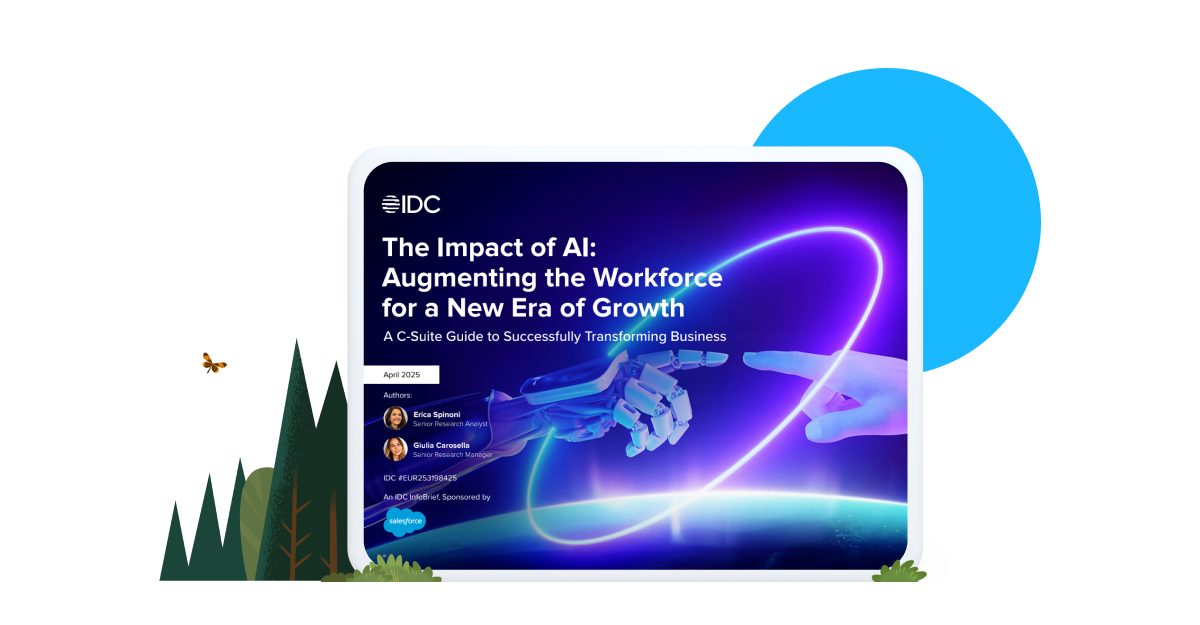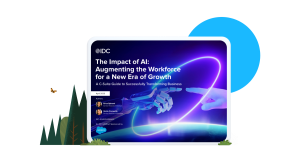The rise of AI Agents
The rise of AI agents is setting new expectations for C-suites to boost revenue, profitability, and productivity. IDC defines AI agents as LLM-powered autonomous software entities that perceive their environment, make decisions, and act upon them based on the goal or objective of the agent. An AI agent may collaborate with other AI agents or may achieve its goal with support from human interactions. IDC’s Future Enterprise Resiliency and Spending Survey (November 2024), found that over the next 18 months, 60% of organizations expect the introduction of agentic AI to have moderate to significant impacts on their competitive position and business operating models [2]. AI agents will act as digital coworkers, revolutionizing the workplace by supporting employees in their daily activities and fueling productivity, innovation, and growth. By 2028, IDC predicts that 40% of business professionals in the top 500 EMEA companies will rely on AI agents and orchestrators for reporting and data workflows, accelerating data access democratization to quickly solve business challenges [3]. It is important for senior business executives to understand and invest in this technological shift. They should focus on four key areas to optimize ROI:
- Invest in AI use cases and assess value realization. Prioritize use cases based on planned business outcomes and feasibility, attaching clear KPIs to each.
- Establish robust AI technology governance. Develop policies and security guidelines to ensure the secure and responsible use of AI.
- Drive people-centric transformation. Invest in needed skills to enhance the workforce’s digital and AI literacy.
- Appoint an AI orchestrator. A chief AI officer, tech leader, or center of excellence should coordinate investments under a unified strategy.
How Will the Age of Agents Impact C-Suites? The CEO: Turning AI into an Asset to Deliver Business Success
IDC’s Worldwide CEO Survey (February 2024) found that almost 40% of EMEA CEOs regard GenAI investment as a driver of competitive advantage — and they want to seize this opportunity as soon as possible [4]. As AI’s impact continues to grow, AI proficiency has emerged as a critical skill for CEOs to be successful in their role. CEOs must embrace and steer change to ensure that AI investments are aligned with the strategic objectives of growing the business and strengthening its competitive position. IDC advises CEOs to appoint an AI orchestrator to drive an enterprisewide strategy. They should ensure that the orchestrator has a prominent strategic role that enables them to support collaboration and change management across the entire organization, including the C-suite.
The CIO and the CTO: Orchestrating AI to Deliver Business Value
The era of AI agents provides the next bump up on the CIO and CTO path, if they manage to balance modernization with innovation and digital business orchestration. It has not been easy, nor has progression been linear, moving from IT management to the role of digital business orchestrator, but CIOs and CTOs are in a unique position to reinforce their strategic role. Their success will hinge on their ability to obtain results in terms of value creation, talent and change management, data, governance and technology architecture, and strengthening collaboration with the C-suite.
Trust and robust guardrails are essential, as CIOs and CTOs play a critical role in protecting the organization from AI-related risks, and ensuring the responsible use of technology. Additionally, CIOs must closely collaborate with HR to foster a culture shift to embrace AI. This involves ensuring that the workforce is equipped with the necessary skills and mindset to adopt new technologies. Effective talent and change management strategies will be key to navigating this transition.
In addition to pushing AI use cases within specific functions (e.g., application management and intelligent IT service desk), CIOs and CTOs will need to orchestrate cross-functional use cases for marketing, sales, customer service, and other business functions.
The Chief Marketing Officer: Leveraging AI to Deliver Superior Customer Experience
IDC’s Worldwide C-Suite Tech Survey (August 2024) confirmed that CMOs are under increasing pressure to provide more personalized and tailored messaging and content. AI provides a key tool to help them unlock these opportunities and deliver larger returns on campaigns and initiatives [5].
AI agents will open opportunities to create hyper-personalized content and campaigns to enhance customer experience. Internally, they will empower the marketing function to achieve greater efficiency and productivity in campaign management and to gain deeper insights by consolidating data from various systems. As CMOs progress on the AI path, they will achieve unified customer views that can be leveraged to foster innovation and the development of customer-centric products and use cases.
The Chief Revenue Officer: Identifying Personalized Entry Points via AI-Powered Insights
AI and AI agent capabilities can provide relevant, contextual information at the right moment, enabling CROs to enhance sales strategy and operations. Use cases that enable the achievement of such objectives include email and proposal automation, enhanced sales forecasting and customer prospecting, intelligent and automated contract creation, and personalized training and coaching.
In IDC’s C-suite survey, more than one-third of CROs said they would use the sales pipeline, revenue, and booking metrics to assess the organization’s tech and AI investments — in particular, those aimed at boosting sales rep productivity to drive more customer conversations and bridge the sales-to-revenue gap [5].
The Customer Service: Using AI to Drive Customer Satisfaction, Channel Coordination
IDC’s C-suite survey found that customer service leaders continue to struggle with a lack of customized and personalized service strategies and cross-channel visibility [5]. By leveraging the capabilities of AI agents, they can start connecting multiple data sources across the organization to provide targeted and ad hoc services.
Externally, AI use cases, such as agent-based 24 x 7 customer service, can deliver seamless customer experiences. Internally, AI use cases can enhance workforce management to, for example, support human and agent scheduling and interactions.
To create a unique view of the customer that aligns and is useful across functions, customer service leaders must also prioritize collaboration with multiple functions, such as marketing and sales.
The Chief Operating Officer: Using AI to Transform Procurement and Contracts
To thrive in the Age of Agents, COOs must go beyond ensuring business continuity and protecting against disruptions. They must leverage AI to drive workforce and process transformation and enhance efficiency and innovation. They should prioritize AI tools to foster internal communication and collaboration, boost customer experience, and improve supply chain transparency and sustainability.
Within the operations functions, the transformative power of AI and AI agents can unlock automated RFP and automated/optimized procurement cycle work cases in collaboration with the procurement officer. IDC’s C-suite survey revealed that for more than 55% of EMEA COOs, improved supplier management is the primary objective they seek to achieve from technology investments [5].
Conclusion
Ultimately, effective and valuable AI deployments depend on the four key principles of collaboration, change management, governance, and business and workforce transformation.
To execute the changes that AI initiatives require, executives should:
- Demonstrate ROI: Clearly showcase and communicate the returns from AI investments using appropriate metrics to the right stakeholders.
- Deliver Unified Governance: Establish a comprehensive governance framework encompassing risk management and ethical guidelines to ensure a secure AI environment.
- Appoint an AI Orchestrator: This role should lead a unified AI strategy and coordinate investments across all functions.
- Maximize Revenue: Implement cross-departmental use cases to unlock larger revenue opportunities by leveraging data and information effectively.
- Invest in AI Agents: Focus on AI agents to automate mundane tasks, freeing the workforce to concentrate on higher-value activities.
IDC Infobrief: The Impact of AI
Gain the strategic guidance needed to align your AI initiatives with business goals. Learn from top organizations to rapidly achieve growth, productivity, and profitability, ensuring you stay ahead of the curve.

- [1] EMEA FutureScape 2025: Creating the Sustainable AI-Fueled Business of the Future (IDC #EUR152838224, December 2024) –
- [2] IDC’s Future Enterprise Resiliency and Spending Survey, Wave 11, November 2024 (EMEA n = 220)
- [3] EMEA FutureScape 2025: Creating the Sustainable AI-Fueled Business of the Future (IDC #EUR152838224, December 2024)
- [4] IDC’s Worldwide CEO Survey, February 2024 (EMEA n = 67)
- [5] IDC’s Worldwide C-Suite Tech Survey, August 2024 (EMEA n = 320)





















